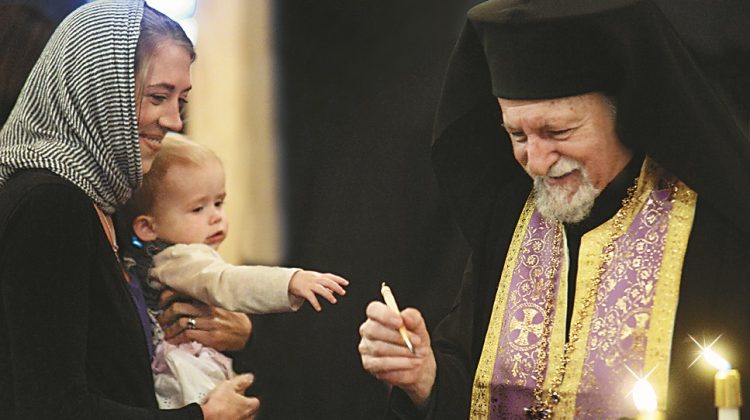December is a busy time in the Orthodox tradition. Beyond the Nativity celebration, the month also features the feast days of some flashy, well-known fathers like Saint Nicholas (Dec. 6), Saint Spyridon (Dec. 12), and Saint Stephen, the first martyr from the Book of Acts (Dec. 27).
Often lost in the shuffle is a second-century martyr who changed my life: St. Ignatius of Antioch. His feast day is fast approaching (Dec. 20), and I want to carve out time and attention to honor him. If you’re new to the Faith, or seeking to deepen your existing Orthodox faith, his writings are well worth your time.

About That “Memorial Supper”…
Back in March of 2009, I was at a place of spiritual burnout (as I chronicled here). My hubby and I were immersed in Matthew Gallatin’s book, Thirsting for God in a Land of Shallow Wells (Best. Title. Ever.), and when I reached the chapter on the Eucharist, a quote from St. Ignatius floored me.
In one of seven letters written on his way to martyrdom in 107 A.D., Ignatius warned the believers in Smyrna about a heretical group, known in history as the Docetists. Their “spiritual” form of Christianity denied Jesus’ actual bodily existence, teaching that he only appeared to be human. This belief led them to deemphasize the importance of people’s physical needs and also the reality of Christ’s presence in the Eucharist.
Ignatius didn’t mince words. With no tolerance for diverse theological opinion, he referred to these false teachers as “wild beasts in human form” who “teach heterodox things” (Letter to the Smyrnaeans 4.1, 6.2). He continued, in words that changed my life 1,900 years later:
They [the heretics] abstain from the Eucharist and from prayer because they do not confess that the Eucharist is the flesh of our Savior Jesus Christ, that flesh which suffered for our sins but which the Father raised in his kindness (Smyrnaeans 7.1).
Wait. What?

I had thought that the flesh-and-blood thing was a later invention of the Roman Catholic Church, and that good (read “Protestant”) Christians aren’t exactly sure what Jesus meant when he said, “Take, eat; this is my body….This is my blood” (Matt. 26:26-28; Mark 14:22-24; Luke 22:19-20). It’s all symbolic, right?
Most of my Christian life had been spent in churches of the Anabaptist tradition, and “communion” was taught as a “memorial supper” with no inherent power—and certainly no Catholic superstition attached to it.

Yet at the very beginning of Christianity, St. Ignatius affirmed that the bread and the wine are truly the Body and Blood of Jesus Christ. They are not merely a memorial supper but the very “medicine of immortality” (Letter to the Ephesians, 20:2).
I was stunned. And I’ve had more theological training than the average layperson, with a bachelor’s degree in religion and some master’s work in theology (a fact which has little to do with personal godliness but shows that, like Winnie the Pooh, my brain is all stuffed with fluff).
Why did I not know about this man? St. Ignatius was the third bishop of Antioch, succeeding St. Evodius, who came after the Apostle Peter. Ignatius knew Peter and was also a disciple of the Apostle John. One of Ignatius’s seven letters was a personal letter to St. Polycarp, who was also a disciple of the Apostle John.
Ignatius’s credentials are unbeatable. As I pondered his words, I was floored that a disciple of the disciples proclaimed that any teaching that denied the physical reality of the Body and Blood was heretical. I remember thinking, “This changes everything.”
If the bread and the wine are truly the Body and Blood of Jesus Christ, then communion becomes central to worship, not a monthly or quarterly memorial event.
As I continued reading, I discovered that St. Ignatius was not some lone, dissident voice in proclaiming Christ’s real presence in the Eucharist. Theologians of the historic Church, from the first century through the fifth and onward, have always affirmed this doctrine: Saints Justin Martyr, Irenaeus of Lyon, Clement of Alexandria, Cyprian of Carthage, Cyril of Jerusalem, Augustine of Hippo, and other revered Fathers of the Church.

I thought about St. Ignatius every single day for a month. I thought about him on my way to pick up my children from their nondenominational Protestant school. While snowflakes dappled the windshield, I waved at the other parents and reflected that most of the committed Christians I saw believed a heresy that was roundly condemned for the first 1,500 years of Christianity.

I thought about St. Ignatius at stoplights and at the kitchen counter while I chopped vegetables. As I thought about him, I couldn’t escape the centrality of the Eucharist to the Christian faith. I also couldn’t escape a nagging question: If the Church was unified in this truth for its entire history, up until the theological splintering of the Protestant Reformation, what else had I not been taught?
Hierarchy and Unity
Eager to read more, I ordered a collection of St. Ignatius’s epistles with commentary. Looking back, I think I was hoping for a connection to the past through him—maybe a spark of inspiration to light my spiritual fuse.
I certainly did not expect my tidy theological views to be upended even further. But it became clear that this holy man practiced a form of Christianity that was quite foreign to my experience.
I quickly encountered another stunner in his writings, something that was seriously at odds with my many Baptist and nondenominational (but still basically Baptist) years: the hierarchical nature of authority in the very early years of the Church.
The concept of autonomous congregations, or even a hierarchical form of church governance with differing doctrines, was scandalous to Ignatius. On several occasions he stresses obedience to the bishop, not as an exercise of power and oppression, but as an expression of love and unity:
Therefore it is fitting for you to run your race together with the bishop’s purpose—as you do. For your presbytery—worthy of fame, worthy of God—is attuned to the bishop like strings to a lyre. Therefore by your unity and harmonious love Jesus Christ is sung. Each of you must be part of this chorus so that, being harmonious in unity, receiving God’s pitch in unison, you may sing with one voice through Jesus Christ to the Father, so that he may both hear you and recognize you, through what you do well, as members of his Son. Therefore it is profitable for you to be in blameless unison, so that you may always participate in God (Ephesians 4:1-2).*

In his wonderfully accessible book about this early saint from Ancient Faith Publishing, Fr. Andrew Damick notes, “This image of the ecclesial song is a beautiful introduction to Ignatius’s thoughts on unity, for in one clear picture he paints for us what it means to be a Christian. We as the Church are to be one in all things, at one with the clergy, especially the bishop, loving Christ, receiving from God how we are to live, becoming members of Christ, and in doing so, participating in God” (Bearing God: The Life and Works of St. Ignatius of Antioch the God-Bearer, p. 110).
Until St. Ignatius, I had never encountered such a sublime vision of Church unity. Although I had received much wise teaching on the importance of submission to one’s pastor(s) and elders—a teaching that admittedly has been abused throughout all of Church history—there was one (largely unmentioned) problem: each leader taught and believed different things—even within the same elder board.
To whom—and what—was I supposed to submit? If I began attending the church down the street, I would need to submit to a different set of beliefs and practices. Where was this unity?

Fr. Andrew continues, “One of the marks of Christianity for Ignatius is unity in doctrine, specifically doctrine about Jesus Christ. If someone does not believe in the true teachings of the apostles, … then he is not really a Christian. But the oneness of Christ with His Father and the oneness of the believer with Christ will yield a oneness of doctrine and a oneness of Christian life between believers” (Bearing God, p. 112).
As he faced martyrdom, St. Ignatius was fearless, unwavering, and filled with love and devotion to Christ and a deep, pastoral love for the Church. These qualities shine through each epistle. It is easy to understand why his letters were so treasured by early Christians that they passed them around among the churches as scripture, just as the Apostle Paul’s letters were circulated.
Holy Ignatius, pray for us!
Troparion (hymn to commemorate a feast day)
By sharing in the ways of the Apostles,
you became a successor to their throne.
Through the practice of virtue, you found the way to divine contemplation,
O inspired one of God;
by teaching the word of truth without error, you defended the Faith,
even to the shedding of your blood.
Hieromartyr Ignatius, entreat Christ God to save our souls.
Kontakion (hymn that explains the meaning of the feast)
The stirring celebration of your victorious fight
Is an announcement of the One who is to be born of the Virgin.
In your eagerness to possess Him forever,
You hastened to be devoured by the wild beasts.
Therefore, O glorious Ignatius, you were called the bearer of God!
***
* In this post I am using quotations from Fr. Andrew Damick’s Bearing God, which relies on Fr. Jack Sparks’s edition of the Apostolic Fathers (translated by Robert M. Grant). Many free online translations of St. Ignatius’s letters are available for devotional reading; however, be aware that they use a King James form of English, even though they were translated into English in the 19th century, long after the usage of “thee” and “sayest” fell out of common practice. You might want to pay for a more modern-language edition.
Coming from a nondenominational background as well, specifically leaving it just a few months ago, I feel the same way about these early Church Fathers and there teachings. It hurt me when I thought why we weren’t taught this in Church or, more importantly, why I never thought to read up on it myself. We send our children to school where they learn the history of their country and claim its importance but it baffles me why the Church, at least in America, does not do the same thing. Thank you for this post being that it was St. Ignatius’s writings that I first read as well. Glory to God!
Yes, I felt “cheated” too. The curricula and texts in Protestant seminaries are highly edited. For example, here’s what I learned about the Council of Nicaea: Arianism, the finalization of the canon of the New Testament, the Nicene Creed, and some of the players. If the Virgin Mary’s title as Theotokos was mentioned, it certainly was not emphasized. But I don’t think this type of omission was deliberate suppression; the professors had been educated with certain filters in place, and the institutional bias is passed through the newly ordained pastors and on to their churches. I am so thankful that St. Ignatius’s letters have survived!
You aren’t the first person I have heard of who was personally “snagged” by Saint Ignatius. He seems to be good at catching people and wooing them into the church. I don’t know him well but I am very thankful for him!
So am I! He continues to lead people to Christ and His Church. I can’t wait to meet him someday!